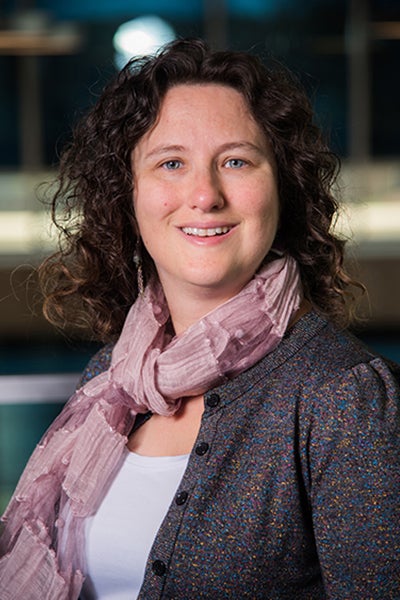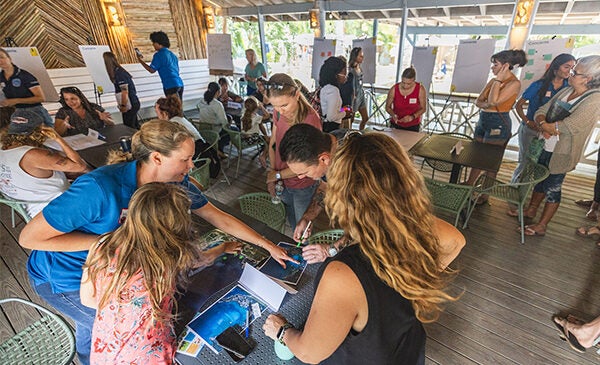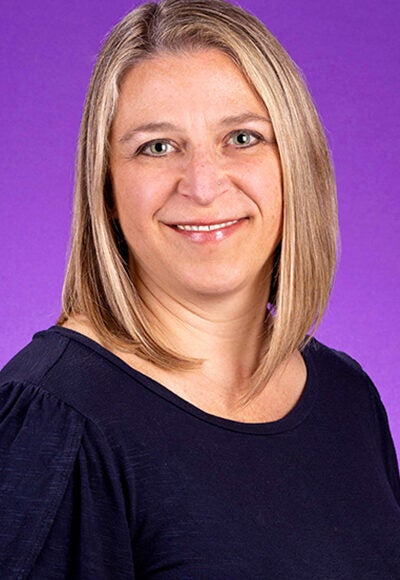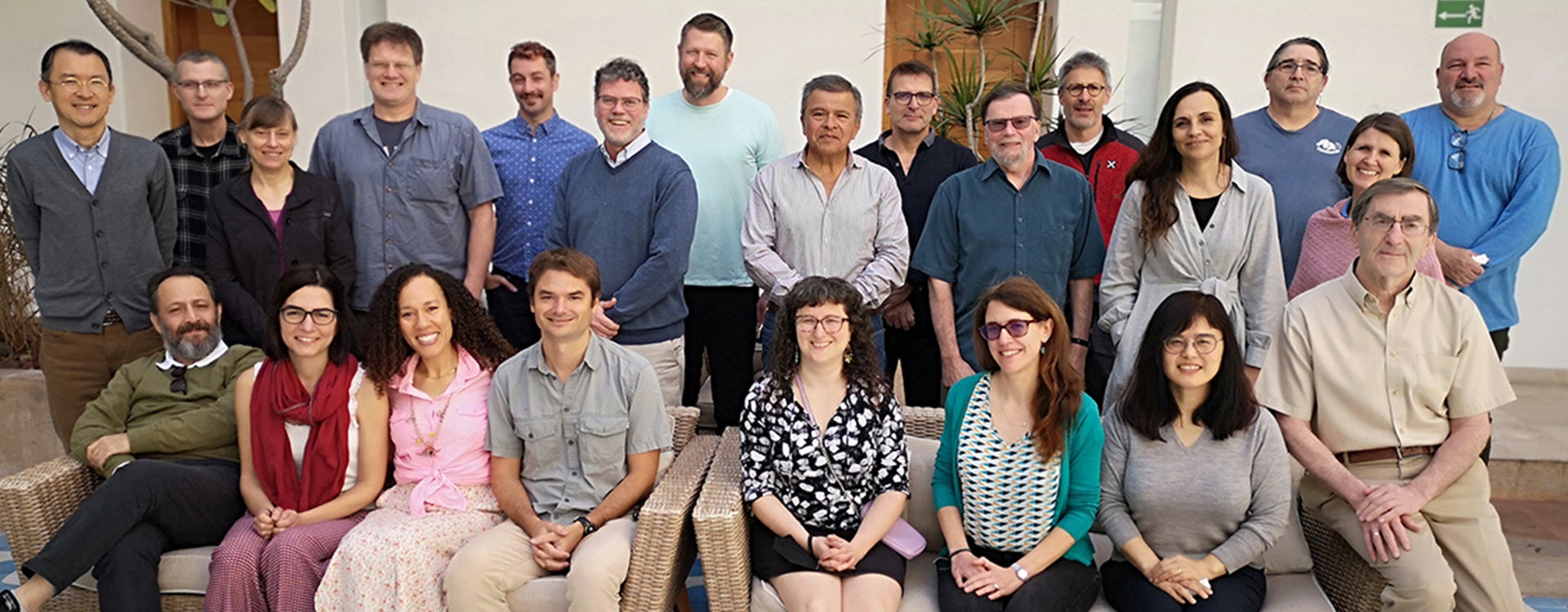ECU faculty selected for prestigious recognition as women science leaders
East Carolina University faculty members in the Thomas Harriot College of Arts and Sciences and Integrated Coastal Programs have been selected for a prestigious national recognition.
Dr. Rebecca Asch, associate professor in the Department of Biology, and Dr. Cynthia A. Grace-McCaskey, associate professor in the Department of Anthropology and research associate at the Coastal Studies Institute, are two of 22 women science leaders selected as 2024 NSF-EPF Ocean Decade Champions.
Champions are awarded by the National Science Foundation in collaboration with the Every Page Foundation. Each champion is associated with a project funded by the NSF Coastlines and People program, which focuses on coastline and community research that integrates natural and social processes and creates new or adapts existing technologies to bolster coastal resilience.
“Interdisciplinary approaches allow for a comprehensive understanding of these interconnected systems. I am immensely proud that Drs. Asch and Grace-McCaskey are being recognized for their innovative work,” said Dr. Allison Danell, dean of Thomas Harriot College of Arts and Sciences. “I am also appreciative of the longstanding partnership we enjoy with CSI that offers such a rich environment for collaborative research.”
Awardees receive a monetary award, ranging from $20,000 to $50,000, that supports leadership activities, networking opportunities, technical and communications training, and cross-disciplinary and intercultural scientific endeavors.
“It is exciting to see such an honor for our faculty,” said Dr. Reide Corbett, dean of Integrated Coastal Programs and executive director of the Coastal Studies Institute.
Asch
“I am really honored to receive this award,” Asch said. “I am especially honored to be part of such an impressive cohort of women who are taking on leadership roles to create a sustainable and healthy global ocean to support coastal communities around the world.”

Dr. Rebecca Asch, associate professor in the Department of Biology, is one of two ECU women scientists selected as a 2024 NSF-EPF Ocean Decade Champion. (Contributed Photo)
Asch is a fisheries oceanographer researching interactions between fish reproduction, fish early life history, plankton ecology, climate change and climate variability. Two areas of her research are tied to this award, which reflects local activities in North Carolina and international research.
First, along with Dr. Stephen Moysey, director of ECU’s Water Resources Center (WRC) and professor in the Department of Geological Sciences, and Dr. Michael O’Driscoll, associate director of the WRC and professor in the Department of Coastal Studies, Asch aims to map, model and understand environmental justice challenges facing four communities in eastern North Carolina. As part of this research, they have discovered that saltwater intrusion associated with climate change, drought and changing water use patterns is affecting several North Carolina waterways to a greater extent than previously known.

Dr. Cynthia Grace-McCaskey (back of the photo, pink tank top) attended a March 2024 community workshop on St. Thomas, where she led a breakout table session for a community-shared vision for mangrove and coral restoration. (Contributed photo)
Asch and graduate student Jordan Strickland are trying to understand how these changes will impact fish populations that people depend on for commercial and recreational activities. Strickland is one of several graduate students in the Master of Science in Biology, the Interdisciplinary Doctoral Program in Biology, Biomedicine, and Chemistry and the doctoral program in Integrated Coastal Sciences advised and mentored by Asch.
Secondly, Asch co-chairs an international working group on forage fish, their role in marine ecosystems and global fisheries for these species. The working group is jointly sponsored by the International Council for Exploration of the Sea (ICES) and the North Pacific Marine Science Organization (PICES).
Forage fishes, such as sardine, anchovy and menhaden, make up approximately 30% of global fisheries catch. They play an indispensable role in providing protein to feed people, serve as a key source of fish meal supporting aquaculture and agriculture operations, and are important prey for large predatory fishes, seabirds and whales.
However, Asch said these fish populations are subject to boom-bust dynamics, making them difficult to manage sustainably. They are also extremely sensitive to climate agitations since they are closely connected to the base of the ocean food web.
“Our working group is conducting research synthesizing global knowledge across several regions to better understand these issues, promote ecosystem-based fisheries management and forecast how this resource will respond to climate change,” said Asch. “In 2026, we will hold an international symposium in La Paz, Mexico, to showcase research on these topics.”
With a portion of funding from the Ocean Decade Champion award, Asch will support the ongoing efforts of science outreach and education conducted by students in ECU’s chapter of the American Fisheries Society. Each year, ECU-AFS students, including current president and biology graduate student Jessica Miller, work with the North Carolina Museum of Natural Sciences to introduce K-12 students in eastern North Carolina schools to the fisheries biology of local species via the Shad in the Classroom program. Through the program, ECU students travel to the schools to lead a lesson on shad biology and how to dissect an adult shad. K-12 students raise shad fry and release them into local rivers.
Grace-McCaskey

Dr. Cynthia Grace-McCaskey, associate professor in the Department of Anthropology and research associate at the Coastal Studies Institute, is one of two ECU women scientists selected as a 2024 NSF-EPF Ocean Decade Champion.
(Photo by Rhett Butler)
“I am honored to receive this award, and to be recognized as part of this amazing group of women scientists,” Grace-McCaskey said.
Grace-McCaskey is an applied environmental anthropologist with expertise in the human dimensions of marine and coastal resource management issues. She examines the ways social and natural systems interact with and influence one another and what that means for equitable resource management, adaptation and governance.
Her award is affiliated with a multi-site, multi-national National Science Foundation Coastlines and Peoples grant. She said the “Strong Coasts: Equitable Solutions with Nature and People” project, co-directed by the University of South Florida, explores risks and benefits to communities in tropical coral reef-dependent communities where replenishing coral reef and mangrove ecosystems has been piloted and may be scaled up to regional and national management levels as nature-based solutions.
“Through this project, we are working to co-create new knowledge with coastal communities in Florida, the U.S. Virgin Islands and Belize on how ecosystem-based processes can help address climate risk and support equitable and appropriate nature-based solutions,” she said. “The team’s complementary expertise in engineering, ecology and social sciences, linking seven academic institutions, multiple local partners and cross-regional organizations, expands the scope of potential research outcomes to the entire U.S. and ultimately to global tropical coastlines beyond the three focus regions.”
Grace-McCaskey’s primary contribution to this project is conducting community-engaged research in the U.S. Virgin Islands. She and Integrated Coastal Sciences doctoral student Alexandra Stevenson aim to identify opportunities for members of vulnerable communities to contribute to coral and mangrove restoration activities and the reduction of associated climate risks.
“We are beginning the third year of the grant and recently held a community workshop on St. Thomas, co-organized with local partners from the University of the Virgin Islands to create a community-shared vision for mangrove and coral restoration in one community, and to collect information regarding community members’ concerns and goals related to restoration activities,” she said.
With funding from the Ocean Decade Champion award, Grace-McCaskey traveled to Cape Town, South Africa, in October to attend the 7th International Marine Conservation Congress. She shared information about the community workshop on St. Thomas and connected with representatives and practitioners from numerous global agencies and organizations working on increasing equitable engagement.
“The funds will also be used to support a workshop we are planning for 2025 focused on the ethics of co-design with Black, Indigenous and other underestimated communities,” she said.
To learn more about all 2024 Ocean Decade Champions, visit the NSF website.

Dr. Rebecca Asch (front row, fifth from left) attended the February 2024 meeting of the ICES-PICES Joint Working Group on Sustainable Forage Communities, which she co-chairs. (Contributed photo)